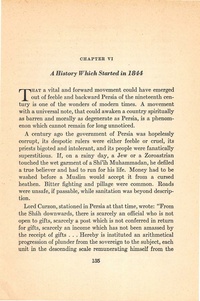This Earth One Country/A history which started in 1844
The text below this notice was generated by a computer, it still needs to be checked for errors and corrected. If you would like to help, view the original document by clicking the PDF scans along the right side of the page. Click the edit button at the top of this page (notepad and pencil icon) or press Alt+Shift+E to begin making changes. When you are done press "Save changes" at the bottom of the page. |
CHAPTER VI
A History Which Started in 1844
HAT a vital and forward movement could have emerged Lees of feeble and backward Persia of the nineteenth century is one of the wonders of modern times. A movement with a universal note, that could awaken a country spiritually as barren and morally as degenerate as Persia, is a phenomenon which cannot remain for long unnoticed.
A century ago the government of Persia was hopelessly corrupt, its despotic rulers were either feeble or cruel, its priests bigoted and intolerant, and its people were fanatically superstitious. If, on a rainy day, a Jew or a Zoroastrian touched the wet garment of a Shi’ih Muhammadan, he defiled a true believer and had to run for his life. Money had to be washed before a Muslim would accept it from a cursed heathen. Bitter fighting and pillage were common. Roads were unsafe, if passable, while sanitation was beyond description.
Lord Curzon, stationed in Persia at that time, wrote: “From
the Shah downwards, there is scarcely an official who is not open to gifts, scarcely a post which is not conferred in return for gifts, scarcely an income which has not been amassed by the receipt of gifts .. . Hereby is instituted an arithmetical progression of plunder from the sovereign to the subject, each unit in the descending scale remunerating himself from the
135
[Page 136]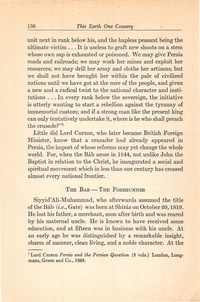 ,
,
136 This Earth One Country
unit next in rank below his, and the hapless peasant being the ultimate victim ... It is useless to graft new shoots on a stem whose own sap is exhausted or poisoned. We may give Persia roads and railroads; we may work her mines and exploit her resources; we may drill her army and clothe her artisans; but we shall not have brought her within the pale of civilized nations until we have got at the core of the people, and given a new and a radical twist to the national character and institutions ... In every rank below the sovereign, the initiative is utterly wanting to start a rebellion against the tyranny of immemorial custom; and if a strong man like the present king can only tentatively undertake it, where is he who shall preach the crusade?”?
Little did Lord Curzon, who later became British Foreign Minister, know that a crusader had already appeared in Persia, the import of whose reforms may yet change the whole world. For, when the Bab arose in 1844, not unlike John the Baptist in relation to the Christ, he inaugurated a social and spiritual movement which in less than one century has crossed almost every national frontier.
Tue Bas — Tue ForeRuNNER
Siyyid’Ali-Muhammad, who afterwards assumed the title of the Bab (2.e., Gate) was born at Shiraz on October 20, 1819. He lost his father, a merchant, soon after birth and was reared by his maternal uncle. He is known to have received some education, and at fifteen was in business with his uncle. At an early age he was distinguished by a remarkable insight, charm of manner, clean living, and a noble character. At the
- Lord Curzon Persia and the Persian Question (2 vols.) London, Longmans, Green and Co., 1892.
[Page 137]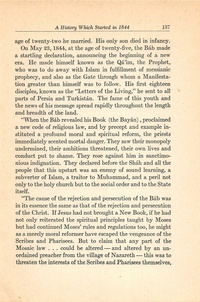 A History Which Started in 1844 ~ 187
A History Which Started in 1844 ~ 187
age of twenty-two he married. His only son died in infancy.
On May 23, 1844, at the age of twenty-five, the Bab made a startling declaration, announcing the beginning of a new era. He made himself known as the Qa’im, the Prophet, who was to do away with Islam in fulfillment of messianic prophecy, and also as the Gate through whom a Manifestation greater than himself was to follow. His first eighteen disciples, known as the “Letters of the Living,” he sent to all parts of Persia and Turkistan. The fame of this youth and the news of his message spread rapidly throughout the length and breadth of the land.
“When the Bab revealed his Book (the Bayan) , proclaimed a new code of religious law, and by precept and example instituted a profound moral and spiritual reform, the priests immediately scented mortal danger. They saw their monopoly undermined, their ambitions threatened, their own lives and conduct put to shame. They rose against him in sanctimonious indignation. They declared before the Shah and all the people that this upstart was an enemy of sound learning, a subyerter of Islam, a traitor to Muhammad, and a peril not only to the holy church but to the social order and to the State itself.
“The cause of the rejection and persecution of the Bab was
in its essence the same as that of the rejection and persecution
of the Christ. If Jesus had not brought a New Book, if he had
not only reiterated the spiritual principles taught by Moses
but had continued Moses’ rules and regulations too, he might
as a merely moral reformer have escaped the vengeance of the
Scribes and Pharisees. But to claim that any part of the
Mosaic law . . . could be altered — and altered by an unordained preacher from the village of Nazareth — this was to
threaten the interests of the Scribes and Pharisees themselves,
[Page 138]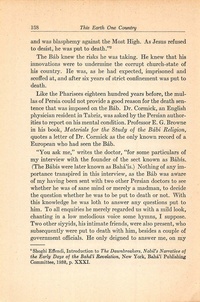 138 This Earth One Country
138 This Earth One Country
and was blasphemy against the Most High. As Jesus refused to desist, he was put to death.’
The Bab knew the risks he was taking. He knew that his innovations were to undermine the corrupt church-state of his country. He was, as he had expected, imprisoned and
scoffed at, and after six years of strict confinement was put to death.
Like the Pharisees eighteen hundred years before, the mullas of Persia could not provide a good reason for the death sentence that was imposed on the Bab. Dr. Cormick, an English physician resident in Tabriz, was asked by the Persian authorities to report on his mental condition. Professor E. G. Browne in his book, Materials for the Study of the Babi Religion, quotes a letter of Dr. Cormick as the only known record of a European who had seen the Bab.
“You ask me,” writes the doctor, “for some particulars of my interview with the founder of the sect known as Babis. (The Babis were later known as Baha’is.) Nothing of any importance transpired in this interview, as the Bab was aware of my having been sent with two other Persian doctors to see whether he was of sane mind or merely a madman, to decide the question whether he was to be put to death or not. With this knowledge he was loth to answer any questions put to him. To all enquiries he merely regarded us with a mild look, chanting in a low melodious voice some hymns, I suppose. Two other siyyids, his intimate friends, were also present, who subsequently were put to death with him, besides a couple of government officials. He only deigned to answer me, on my
- Shoghi Effendi, Introduction to The Dawnbreakers, Nabil’s Narrative of
the Early Days of the Bahd’t Revelation, New York, Bahaé’i Publishing
Committee, 1932, p. XXXT.
[Page 139]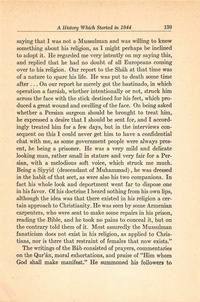 A History Which Started in 1844 _ 189
A History Which Started in 1844 _ 189
saying that I was not a Mussulman and was willing to know something about his religion, as I might perhaps be inclined to adopt it. He regarded me very intently on my saying this, and replied that he had no doubt of all Europeans coming over to his religion. Our report to the Shah at that time was of a nature to spare his life. He was put to death some time after ... On our report he merely got the bastinado, in which operation a farrdsh, whether intentionally or not, struck him across the face with the stick destined for his feet, which produced a great wound and swelling of the face. On being asked _ whether a Persian surgeon should be brought to treat him, he expressed a desire that I should be sent for, and I accordingly treated him for a few days, but in the interviews consequent on this I could never get him to have a confidential chat with me, as some government people were always present, he being a prisoner. He was a very mild and delicate looking man, rather small in stature and very fair for a Persian, with a melodious soft voice, which struck me much. Being a Siyyid (descendant of Muhammad), he was dressed in the habit of that sect, as were also his two companions. In fact his whole look and deportment went far to dispose one in his favor. Of his doctrine I heard nothing from his own lips, although the idea was that there existed in his religion a certain approach to Christianity. He was seen by some Armenian carpenters, who were sent to make some repairs in his prison, reading the Bible, and he took no pains to conceal it, but on the contrary told them of it. Most assuredly the Mussulman fanaticism does not exist in his religion, as applied to Christians, nor is there that restraint of females that now exists.”
The writings of the Bab consisted of prayers, commentaries
on the Qur’an, moral exhortations, and praise of “Him whom
God shall make manifest.” He summoned his followers to
[Page 140]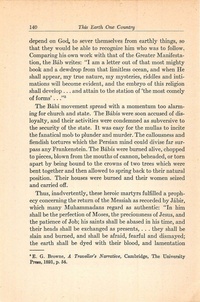 140 This Earth One Country
140 This Earth One Country
depend on God, to sever themselves from earthly things, so that they would be able to recognize him who was to follow. Comparing his own work with that of the Greater Manifestation, the Bab writes: “I am a letter out of that most mighty book and a dewdrop from that limitless ocean, and when He shall appear, my true nature, my mysteries, riddles and intimations will become evident, and the embryo of this religion shall develop . . . and attain to the station of ‘the most comely orforms ...
The Babi movement spread with a momentum too alarming for church and state. The Babis were soon accused of disloyalty, and their activities were condemned as subversive to the security of the state. It was easy for the mullas to incite the fanatical mob to plunder and murder. The callousness and fiendish tortures which the Persian mind could divise far surpass any Frankenstein. The Babis were burned alive, chopped to pieces, blown from the mouths of cannon, beheaded, or torn apart by being bound to the crowns of two trees which were bent together and then allowed to spring back to their natural position. Their houses were burned and their women seized and carried off.
Thus, inadvertently, these heroic martyrs fulfilled a prophecy concerning the return of the Messiah as recorded by Jabir, which many Muhammadans regard as authentic: “In him shall be the perfection of Moses, the preciousness of Jesus, and the patience of Job; his saints shall be abased in his time, and their heads shall be exchanged as presents, . . . they shall be slain and burned, and shall be afraid, fearful and dismayed; the earth shall be dyed with their blood, and lamentation
°E. G. Browne, A Traveller’s Narrative, Cambridge, The University
Press, 1891, p. 54.
[Page 141]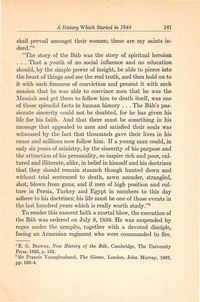 A History Which Started in 1844 141
A History Which Started in 1844 141
shall prevail amongst their women; these are my saints indeed.”*
“The story of the Bab was the story of spiritual heroism ... That a youth of no social influence and no education should, by the simple power of insight, be able to pierce into the heart of things and see the real truth, and then hold on to it with such firmness of conviction and present it with such suasion that he was able to convince men that he was the Messiah and get them to follow him to death itself, was one of those splendid facts in human history . . . The Bab’s passionate sincerity could not be doubted, for he has given his life for his faith. And that there must be something in his message that appealed to men and satisfied their souls was witnessed by the fact that thousands gave their lives in his cause and millions now follow him. If a young man could, in only six years of ministry, by the sincerity of his purpose and the attraction of his personality, so inspire rich and poor, cultured and illiterate, alike, in belief in himself and his doctrines that they should remain staunch though hunted down and without trial sentenced to death, sawn asunder, strangled, shot, blown from guns; and if men of high position and culture in Persia, Turkey and Egypt in numbers to this day adhere to his doctrines; his life must be one of those events in the last hundred years which is really worth study.”®
To render this nascent faith a mortal blow, the execution of the Bab was ordered on July 9, 1850. He was suspended by ropes under the armpits, together with a devoted disciple, facing an Armenian regiment who were commanded to fire.
- E. G. Browne, New History of the Bab, Cambridge, The University
Press, 1893, p. 132.
- Sir Francis Younghusband, The Gleam, London, John Murray, 1923,
pp. 183-4.
[Page 142]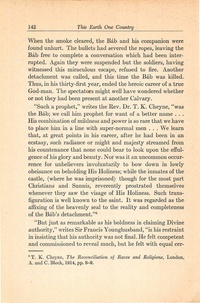
142 This Earth One Country
When the smoke cleared, the Bab and his companion were found unhurt. The bullets had severed the ropes, leaving the Bab free to complete a conversation which had been interrupted. Again they were suspended but the soldiers, having witnessed this miraculous escape, refused to fire. Another detachment was called, and this time the Bab was killed. Thus, in his thirty-first year, ended the heroic career of a true God-man. The spectators might well have wondered whether or not they had been present at another Calvary.
“Such a prophet,” writes the Rev. Dr. T. K. Cheyne, “was the Bab; we call him prophet for want of a better name... His combination of mildness and power is so rare that we have to place him in a line with super-normal men .. . We learn that, at great points in his career, after he had been in an ecstasy, such radiance or might and majesty streamed from his countenance that none could bear to look upon the effulgence of his glory and beauty. Nor was it an uncommon occurrence for unbelievers involuntarily to bow down in lowly obeisance on beholding His Holiness; while the inmates of the castle, (where he was imprisoned) though for the most part Christians and Sunnis, reverently prostrated themselves whenever they saw the visage of His Holiness. Such transfiguration is well known to the saint. It was regarded as the affixing of the heavenly seal to the reality and completeness of the Bab’s detachment.’®
“But just as remarkable as his boldness in claiming Divine authority,” writes Sir Francis Younghusband, “is his restraint in insisting that his authority was not final. He felt competent and commissioned to reveal much, but he felt with equal cer
°T. K. Cheyne, The Reconciliation of Races and Religions, London,
A. and C. Block, 1914, pp. 8-9.
[Page 143]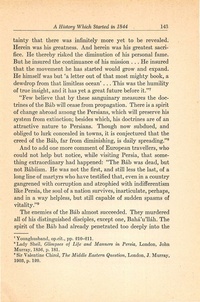 A History Which Started in 1844. 143
A History Which Started in 1844. 143
tainty that there was infinitely more yet to be revealed. Herein was his greatness. And herein was his greatest sacrifice. He thereby risked the diminution of his personal fame. But he insured the continuance of his mission . .. He insured that the movement he has started would grow and expand. He himself was but ‘a letter out of that most mighty book, a dewdrop from that limitless ocean’... This was the humility of true insight, and it has yet a great future before it.”””
“Few believe that by these sanguinary measures the doctrines of the Bab will cease from propagation. There is a spirit of change abroad among the Persians, which will preserve his system from extinction; besides which, his doctrines are of an attractive nature to Persians. Though now subdued, and obliged to lurk concealed in towns, it is conjectured that the creed of the Bab, far from diminishing, is daily spreading.’®
And to add one more comment of European travellers, who could not help but notice, while visiting Persia, that something extraordinary had happened: “The Bab was dead, but not Babiism. He was not the first, and still less the last, of a long line of martyrs who have testified that, even in a country gangrened with corruption and atrophied with indifferentism like Persia, the soul of a nation survives, inarticulate, perhaps, and in a way helpless, but still capable of sudden spasms of vitality.”®
The enemies of the Bab almost succeeded. They murdered all of his distinguished disciples, except one, Baha’u’llah. The spirit of the Bab had already penetrated too deeply into the
- Younghusband, op.cit., pp. 210-211.
- Lady Sheil, Glimpses of Life and Manners in Persia, London, John
Murray, 1856, p. 181.
- Sir Valentine Chirol, The Middle Eastern Question, London, J. Murray,
1903, p. 120.
[Page 144]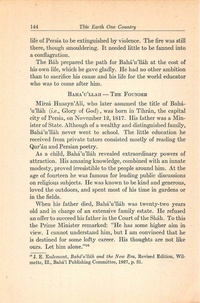 144 This Earth One Country
144 This Earth One Country
life of Persia to be extinguished by violence. The fire was still there, though smouldering. It needed little to be fanned into a conflagration.
The Bab prepared the path for Baha’u’ll4h at the cost of his own life, which he gave gladly. He had no other ambition than to sacrifice his cause and his life for the world educator who was to come after him.
Bawa’u' LLAH — THe FouNnDER
Mirza Husayn’Ali, who later assumed the title of Baha*ullah (z.e., Glory of God), was born in Tihran, the capital city of Persia, on November 12, 1817. His father was a Minister of State. Although of a wealthy and distinguished family, Baha’u’llah never went to school. The little education he received from private tutors consisted mostly of reading the Qur’an and Persian poetry.
As a child, Baha’u’llah revealed extraordinary powers of attraction. His amazing knowledge, combined with an innate modesty, proved irresistible to the people around him. At the age of fourteen he was famous for leading public discussions on religious subjects. He was known to be kind and generous, loved the outdoors, and spent most of his time in gardens or in the fields.
When his father died, Baha’u’ll4h was twenty-two years old and in charge of an extensive family estate. He refused — an offer to succeed his father in the Court of the Shah. To this the Prime Minister remarked: “He has some higher aim in view. I cannot understand him, but I am convinced that he is destined for some lofty career. His thoughts are not like ours. Let him alone.’”?®
J. E. Esslemont, Bahd’wlldh and the New Era, Revised Edition, Wilmette, Ill., Baha’i Publishing Committee, 1927, p. 31.
[Page 145]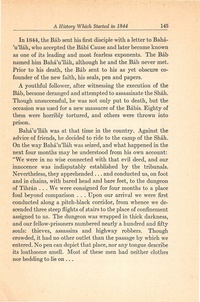 A History Which Started in 1844 145
A History Which Started in 1844 145
In 1844, the Bab sent his first disciple with a letter to Baha’u'llah, who accepted the Babi Cause and later became known as one of its leading and most fearless exponents. The Bab named him Baha’u’llah, although he and the Bab never met. Prior to his death, the Bab sent to his as yet obscure cofounder of the new faith, his seals, pen and papers.
A youthful follower, after witnessing the execution of the Bab, became deranged and attempted to assassinate the Shah. Though unsuccessful, he was not only put to death, but the occasion was used for a new massacre of the Babis. Eighty of them were horribly tortured, and others were thrown into prison.
Baha'u'llah was at that time in the country. Against the
advice of friends, he decided to ride to the camp of the Shah.
On the way Baha’u’llah was seized, and what happened in the
next four months may be understood from his own account:
“We were in no wise connected with that evil deed, and our
innocence was indisputably established by the tribunals.
Nevertheless, they apprehended ... and conducted us, on foot
and in chains, with bared head and bare feet, to the dungeon
of Tihran ... We were consigned for four months to a place
foul beyond comparison .. . Upon our arrival we were first
conducted along a pitch-black corridor, from whence we descended three steep flights of stairs to the place of confinement
assigned to us. The dungeon was wrapped in thick darkness,
and our fellow-prisoners numbered nearly a hundred and fifty
souls: thieves, assassins and highway robbers. Though
crowded, it had no other outlet than the passage by which we
entered. No pen can depict that place, nor any tongue describe
its loathsome smell. Most of these men had neither clothes
nor bedding to lie on...
[Page 146]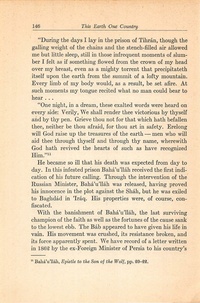 146 This Earth One Country.
146 This Earth One Country.
“During the days I lay in the prison of Tihran, though the galling weight of the chains and the stench-filled air allowed me but little sleep, still in those infrequent moments of slumber I felt as if something flowed from the crown of my head over my breast, even as a mighty torrent that precipitateth itself upon the earth from the summit of a lofty mountain. Every limb of my body would, as a result, be set afire. At such moments my tongue recited what no man could bear to hear...
“One night, in a dream, these exalted words were heard on every side: Verily, We shall render thee victorious by thyself and by thy pen. Grieve thou not for that which hath befallen thee, neither be thou afraid, for thou art in safety. Erelong will God raise up the treasures of the earth — men who will aid thee through thyself and through thy name, wherewith God hath revived the hearts of such as have recognized Him.”
He became so ill that his death was expected from day to day. In this infested prison Baha'u'llah received the first indication of his future calling. Through the intervention of the Russian Minister, Baha’u’llah was released, having proved his innocence in the plot against the Shah, but he was exiled to Baghdad in *Iraq. His properties were, of course, confiscated.
With the banishment of Baha’u’llah, the last surviving champion of the faith as well as the fortunes of the cause sank to the lowest ebb. The Bab appeared to have given his life in vain. His movement was crushed, its resistance broken, and its force apparently spent. We have record of a letter written in 1862 by the ex-Foreign Minister of Persia to his country’s
- Baha’u llah, Epistle to the Son of the Wolf, pp. 20-22.
[Page 147]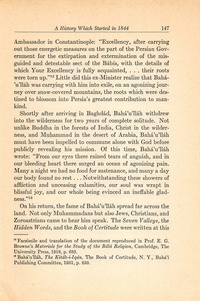 A History Which Started in 1844 147
A History Which Started in 1844 147
Ambassador in Constantinople: “Excellency, after carrying out those energetic measures on the part of the Persian Government for the extirpation and extermination of the misguided and detestable sect of the Babis, with the details of which Your Excellency is fully acquainted, . . . their roots were torn up.” Little did this ex-Minister realize that Baha*u'llah was carrying with him into exile, on an agonizing journey over snow-covered mountains, the roots which were destined to blossom into Persia’s greatest contribution to mankind.
Shortly after arriving in Baghdad, Baha’u’llah withdrew into the wilderness for two years of complete solitude. Not unlike Buddha in the forests of India, Christ in the wilderness, and Muhammad in the desert of Arabia, Baha’u’llaéh must have been impelled to commune alone with God before publicly revealing his mission. Of this time, Baha’u’llah wrote: “From our eyes there rained tears of anguish, and in our bleeding heart there surged an ocean of agonizing pain. Many a night we had no food for sustenance, and many a day our body found no rest .. . Notwithstanding these showers of affliction and unceasing calamities, our soul was wrapt in blissful joy, and our whole being evinced an ineffable gladness,””18
On his return, the fame of Baha’u’ll4h spread far across the land. Not only Muhammadans but also Jews, Christians, and Zoroastrians came to hear him speak. The Seven Valleys, the Hidden Words, and the Book of Certitude were written at this
“Facsimile and translation of the document reproduced in Prof. E. G. Browne’s Materials for the Study of the Babi Religion, Cambridge, The University Press, 1918, p. 283.
- Baha’ullah, The Kitdb-t-Iqdn, The Book of Certitude, N. Y., Baha’t
Publishing Committee, 1931, p. 250.
[Page 148]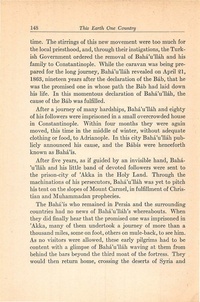 ay ee ee a a a es ee a ee
ay ee ee a a a es ee a ee
148 This Earth One Country
time. The stirrings of this new movement were too much for the local priesthood, and, through their instigations, the Turkish Government ordered the removal of Baha’u’llah and his family to Constantinople. While the caravan was being prepared for the long journey, Baha’u’llah revealed on April 21, 1863, nineteen years after the declaration of the Bab, that he was the promised one in whose path the Bab had laid down his life. In this momentous declaration of Baha’u'lla4h, the cause of the Bab was fulfilled.
After a journey of many hardships, Baha'u'llah and eighty of his followers were imprisoned in a small overcrowded house in Constantinople. Within four months they were again moved, this time in the middle of winter, without adequate clothing or food, to Adrianople. In this city Baha’u’llah publicly announced his cause, and the Babis were henceforth known as Baha'is.
After five years, as if guided by an invisible hand, Baha*ull4h and his little band of devoted followers were sent to the prison-city of “Akka in the Holy Land. Through the machinations of his persecutors, Baha’u’llah was yet to pitch his tent on the slopes of Mount Carmel, in fulfillment of Christian and Muhammadan prophecies.
The Baha’is who remained in Persia and the surrounding countries had no news of Baha’u’llah’s whereabouts. When they did finally hear that the promised one was imprisoned in
- Akka, many of them undertook a journey of more than a
thousand miles, some on foot, others on mule-back, to see him.
As no visitors were allowed, these early pilgrims had to be
content with a glimpse of Baha’u’ll4h waving at them from
behind the bars beyond the third moat of the fortress. They
would then return home, crossing the deserts of Syria and
[Page 149]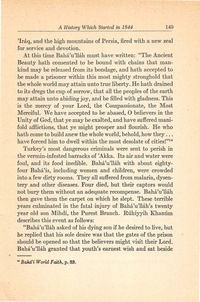 A History Which Started in 1844 149
A History Which Started in 1844 149
"Iraq, and the high mountains of Persia, fired with a new zeal for service and devotion.
At this time Baha’u’ll4h must have written: “The Ancient Beauty hath consented to be bound with chains that mankind may be released from its bondage, and hath accepted to be made a prisoner within this most mighty stronghold that the whole world may attain unto true liberty. He hath drained to its dregs the cup of sorrow, that all the peoples of the earth may attain unto abiding joy, and be filled with gladness. This is the mercy of your Lord, the Compassionate, the Most Merciful. We have accepted to be abased, O believers in the Unity of God, that ye may be exalted, and have suffered manifold afflictions, that ye might prosper and flourish. He who hath come to build anew the whole world, behold, how they .. . have forced him to dwell within the most desolate of cities!”**
Turkey’s most dangerous criminals were sent to perish in the vermin-infested barracks of ’Akka. Its air and water were foul, and its food inedible. Baha’u’llah with about eightyfour Baha’is, including women and children, were crowded into a few dirty rooms. They all suffered from malaria, dysentery and other diseases. Four died, but their captors would not bury them without an adequate recompense. Baha’u’llah then gave them the carpet on which he slept. These terrible years culminated in the fatal injury of Baha’u’llah’s twenty year old son Mihdi, the Purest Branch. Ruhiyyih Khanim describes this event as follows:
“Baha’u llah asked of his dying son if he desired to live, but he replied that his sole desire was that the gates of the prison should be opened so that the believers might visit their Lord. Baha’u'llah granted that youth’s earnest wish and sat beside
“ Baké't World Faith, p. 33.
[Page 150]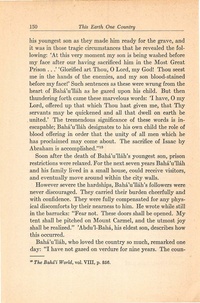 ee ey ee ee ee ee ee a ee ee
ee ey ee ee ee ee ee a ee ee
150 This Earth One Country
his youngest son as they made him ready for the grave, and it was in those tragic circumstances that he revealed the following: ‘At this very moment my son is being washed before my face after our having sacrificed him in the Most Great Prison .. . ‘Glorified art Thou, O Lord, my God! Thou seest me in the hands of the enemies, and my son blood-stained before my face!’ Such sentences as these were wrung from the heart of Baha’u’llah as he gazed upon his child. But then thundering forth came these marvelous words: ‘I have, O my Lord, offered up that which Thou hast given me, that Thy servants may be quickened and all that dwell on earth be united.’ The tremendous significance of these words is inescapable; Baha’u’llah designates to his own child the role of blood offering in order that the unity of all men which he has proclaimed may come about. The sacrifice of Isaac by Abraham is accomplished.”
Soon after the death of Baha’u’llah’s youngest son, prison restrictions were relaxed. For the next seven years Baha’u’llah and his family lived in a small house, could receive visitors, and eventually move around within the city walls.
However severe the hardships, Baha’u’llah’s followers were never discouraged. They carried their burden cheerfully and with confidence. They were fully compensated for any physical discomforts by their nearness to him. He wrote while still in the barracks: “Fear not. These doors shall be opened. My tent shall be pitched on Mount Carmel, and the utmost joy shall be realized.” ’Abdu’l-Baha, his eldest son, describes how this occurred.
Baha'u'llah, who loved the country so much, remarked one day: “I have not gazed on verdure for nine years. The coun
- The Bahai World, vol. VIL, p. 256.
[Page 151]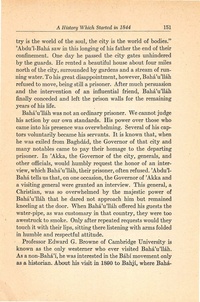 A History Which Started in 1844 151
A History Which Started in 1844 151
try is the world of the soul, the city is the world of bodies.”
- Abdu’l-Baha saw in this longing of his father the end of their
confinement. One day he passed the city gates unhindered by the guards. He rented a beautiful house about four miles north of the city, surrounded by gardens and a stream of running water. To his great disappointment, however, Baha’u’llah refused to move, being still a prisoner. After much persuasion and the intervention of an influential friend, Baha’u’llah finally conceded and left the prison walls for the remaining years of his life. ;
Baha'u'llah was not an ordinary prisoner. We cannot judge his action by our own standards. His power over those who came into his presence was overwhelming. Several of his captors voluntarily became his servants. It is known that, when he was exiled from Baghdad, the Governor of that city and many notables came to pay their homage to the departing prisoner. In ’Akka, the Governor of the city, generals, and other officials, would humbly request the honor of an interview, which Baha’u’llah, their prisoner, often refused. ’Abdu’lBaha tells us that, on one occasion, the Governor of ’Akka and a visiting general were granted an interview. This general, a Christian, was so overwhelmed by the majestic power of Baha’ullah that he dared not approach him but remained kneeling at the door. When Baha’u’llah offered his guests the water-pipe, as was customary in that country, they were too awestruck to smoke. Only after repeated requests would they touch it with their lips, sitting there listening with arms folded in humble and respectful attitude.
Professor Edward G. Browne of Cambridge University is
known as the only westerner who ever visited Baha’u’llah.
As a non-Baha’i, he was interested in the Babi movement only
as a historian. About his visit in 1890 to Bahji, where Baha[Page 152]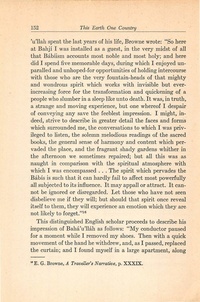 152 This Earth One Country
152 This Earth One Country
- u'llah spent the last years of his life, Browne wrote: “So here
at Bahji I was installed as a guest, in the very midst of all that Babiism accounts most noble and most holy; and here did I spend five memorable days, during which I enjoyed unparalled and unhoped-for opportunities of holding intercourse with those who are the very fountain-heads of that mighty and wondrous spirit which works with invisible but everincreasing force for the transformation and quickening of a people who slumber in a sleep like unto death. It was, in truth, a strange and moving experience, but one whereof I despair of conveying any save the feeblest impression. I might, indeed, strive to describe in greater detail the faces and forms which surrounded me, the conversations to which I was privileged to listen, the solemn melodious readings of the sacred books, the general sense of harmony and content which pervaded the place, and the fragrant shady gardens whither in the afternoon we sometimes repaired; but all this was as naught in comparison with the spiritual atmosphere with which I was encompassed . . . The spirit which pervades the Babis is such that it can hardly fail to affect most powerfully all subjected to its influence. It may appall or attract. It cannot be ignored or disregarded. Let those who have not seen disbelieve me if they will; but should that spirit once reveal itself to them, they will experience an emotion which they are not likely to forget.’’®
This distinguished English scholar proceeds to describe his impression of Baha'u'llah as follows: “My conductor paused for a moment while I removed my shoes. Then with a quick movement of the hand he withdrew, and, as I passed, replaced the curtain; and I found myself in a large apartment, along
“E.G. Browne, A Traveller’s Narrative, p. XX XIX.
[Page 153]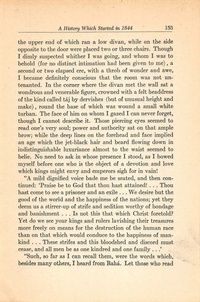 A History Which Started in 1844 153
A History Which Started in 1844 153
the upper end of which ran a low divan, while on the side opposite to the door were placed two or three chairs. Though I dimly suspected whither I was going, and whom I was to behold (for no distinct intimation had been given to me), a second or two elapsed ere, with a throb of wonder and awe, I became definitely conscious that the room was not untenanted. In the corner where the divan met the wall sat a wondrous and venerable figure, crowned with a felt headdress of the kind called taj by dervishes (but of unusual height and make) , round the base of which was wound a small white turban. The face of him on whom I gazed I can never forget, though I cannot describe it. Those piercing eyes seemed to read one’s very soul; power and authority sat on that ample brow; while the deep lines on the forehead and face implied an age which the jet-black hair and beard flowing down in indistinguishable luxuriance almost to the waist seemed to belie. No need to ask in whose presence I stood, as I bowed myself before one who is the object of a devotion and love which kings might envy and emperors sigh for in vain!
“A mild dignified voice bade me be seated, and then continued: ‘Praise be to God that thou hast attained! . . . Thou hast come to see a prisoner and an exile... We desire but the good of the world and the happiness of the nations; yet they deem us a stirrer-up of strife and sedition worthy of bondage and banishment . . . Is not this that which Christ foretold? Yet do we see your kings and rulers lavishing their treasures more freely on means for the destruction of the human race than on that which would conduce to the happiness of mankind . . . These strifes and this bloodshed and discord must cease, and all men be as one kindred and one family .. .’
“Such, so far as I can recall them, were the words which,
besides many others, I heard from Baha. Let those who read
[Page 154]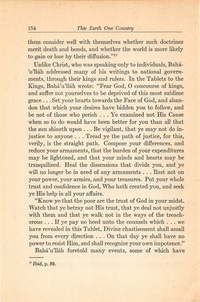 154 This Earth One Country
154 This Earth One Country
them consider well with themselves whether such doctrines merit death and bonds, and whether the world is more likely to gain or lose by their diffusion.””"”
Unlike Christ, who was speaking only to individuals, Baha’u'll4h addressed many of his writings to national govern‘ments, through their kings and rulers. In the Tablets to the Kings, Baha’u’ll4h wrote: “Fear God, O concourse of kings, and suffer not yourselves to be deprived of this most sublime grace ...Set your hearts towards the Face of God, and abandon that which your desires have bidden you to follow, and be not of those who perish ... Ye examined not His Cause when so to do would have been better for you than all that the sun shineth upon .. . Be vigilant, that ye may not do injustice to anyone ... Tread ye the path of justice, for this, verily, is the straight path. Compose your differences, and reduce your armaments, that the burden of your expenditures may be lightened, and that your minds and hearts may be tranquilized. Heal the dissensions that divide you, and ye will no longer be in need of any armaments... Rest not on your power, your armies, and your treasures. Put your whole trust and confidence in God, Who hath created you, and seek | ye His help in all your affairs.
“Know ye that the poor are the trust of God in your midst. Watch that ye betray not His trust, that ye deal not unjustly with them and that ye walk not in the ways of the treacherous ... If ye pay no heed unto the counsels which .. . we have revealed in this Tablet, Divine chastisement shall assail you from every direction . . . On that day ye shall have no power to resist Him, and shall recognize your own impotence.”
Baha’u'llah foretold many events, some of which have
" Ibid, p. 39.
[Page 155]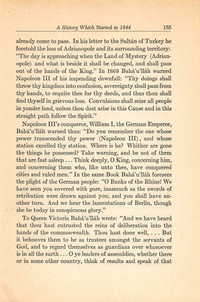
A History Which Started in 1844 155
already come to pass. In his letter to the Sultan of Turkey he foretold the loss of Adrianopole and its surrounding territory: “The day is approaching when the Land of Mystery (Adrianopole) and what is beside it shall be changed, and shall pass out of the hands of the King.” In 1869 Baha’u’ll4h warned Napoleon III of his impending downfall: “Thy doings shall throw thy kingdom into confusion, sovereignty shall pass from thy hands, to requite thee for thy deeds, and thus thou shall find thyself in grievous loss. Convulsions shall seize all people in yonder land, unless thou dost arise in this Cause and in this straight path follow the Spirit.”
Napoleon III’s conqueror, William I, the German Emperor, Baha’u'llah warned thus: “Do you remember the one whose power transcended thy power (Napoleon III), and whose station excelled thy station. Where is he? Whither are gone the things he possessed? Take warning, and be not of them that are fast asleep ... Think deeply, O King, concerning him, and concerning them who, like unto thee, have conquered cities and ruled men.” In the same Book Baha'u'llah foresees the plight of the German people: “O Banks of the Rhine! We have seen you covered with gore, inasmuch as the swords of retribution were drawn against you; and you shall have another turn. And we hear the lamentations of Berlin, though she be today in conspicuous glory.”
To Queen Victoria Baha’u’ll4h wrote: “And we have heard
that thou hast entrusted the reins of deliberation into the
hands of the commonwealth. Thou hast done well, . .. But
it behooves them to be as trustees amongst the servants of
God, and to regard themselves as guardians over whosoever
is in all the earth ...O ye leaders of assemblies, whether there
or in some other country, think of results and speak of that
[Page 156]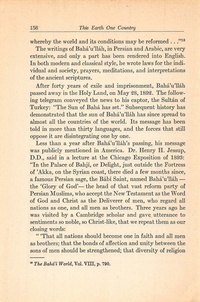 156° This Earth One Country
156° This Earth One Country
whereby the world and its conditions may be reformed . . .””8
The writings of Baha’u’lléh, in Persian and Arabic, are very extensive, and only a part has been rendered into English. In both modern and classical style, he wrote laws for the individual and society, prayers, meditations, and interpretations of the ancient scriptures.
After forty years of exile and imprisonment, Baha’u’llah passed away in the Holy Land, on May 28, 1892. The following telegram conveyed the news to his captor, the Sultan of Turkey: “The Sun of Baha has set.” Subsequent history has demonstrated that the sun of Baha’u’ll4h has since spread to almost all the countries of the world. Its message has been _ told in more than thirty languages, and the forces that still oppose it are disintegrating one by one.
Less than a year after Baha’u’llah’s passing, his message was publicly mentioned in America. Dr. Henry H. Jessup, D.D., said in a lecture at the Chicago Exposition of 1893: “In the Palace of Bahji, or Delight, just outside the Fortress of ’Akka, on the Syrian coast, there died a few months since, a famous Persian sage, the Babi Saint, named Baha’u’llah — the ‘Glory of God’— the head of that vast reform party of Persian Muslims, who accept the New Testament as the Word of God and Christ as the Deliverer of men, who regard all nations as one, and all men as brothers. Three years ago he was visited by a Cambridge scholar and gave utterance to sentiments so noble, so Christ-like, that we repeat them as our closing words:
“That all nations should become one in faith and all men as brothers; that the bonds of affection and unity between the sons of men should be strengthened; that diversity of religion
» The Baha'i World, Vol. VIII, p. 790.
[Page 157]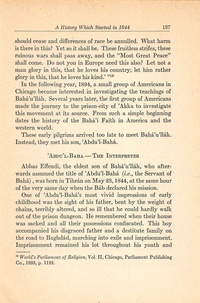 A History Which Started in 1844 157
A History Which Started in 1844 157
should cease and differences of race be annulled. What harm is there in this? Yet so it shall be. These fruitless strifes, these ruinous wars shall pass away, and the “Most Great Peace” shall come. Do not you in Europe need this also? Let not a man glory in this, that he loves his country; let him rather glory in this, that he loves his kind.’ ”!°
In the following year, 1894, a small group of Americans in Chicago became interested in investigating the teachings of Baha’u'llah. Several years later, the first group of Americans made the journey to the prison-city of "Akka to investigate this movement at its source. From such a simple beginning dates the history of the Baha’i Faith in America and the western world.
These early pilgrims arrived too late to meet Baha’u’llah. Instead, they met his son, Abdu’l-Baha.
- Aspu’L-Baua — THE INTERPRETER
Abbas Effendi, the eldest son of Baha’u’llah, who afterwards assumed the title of ’Abdu’l-Baha (7.e., the Servant of Baha) , was born in Tihran on May 23, 1844, at the same hour of the very same day when the Bab declared his mission.
One of ’Abdu’l-Baha’s most vivid impressions of early childhood was the sight of his father, bent by the weight of chains, terribly altered, and so ill that he could hardly walk out of the prison dungeon. He remembered when their house was sacked and all their possessions confiscated. This boy accompanied his disgraced father and a destitute family on the road to Baghdad, marching into exile and imprisonment. Imprisonment remained his lot throughout his youth and
” World’s Parliament of Religion, Vol. I1, Chicago, Parliament Publishing
Co., 1893, p. 1122.
[Page 158]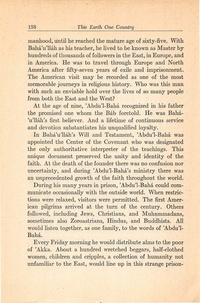 158 This Earth One Country
158 This Earth One Country
manhood, until he reached the mature age of sixty-five. With Baha’u’llah as his teacher, he lived to be known as Master by hundreds of thousands of followers in the East, in Europe, and in America. He was to travel through Europe and North America after fifty-seven years of exile and imprisonment. The American visit may be recorded as one of the most memorable journeys in religious history. Who was this man with such an enviable hold over the lives of so many people from both the East and the West?
At the age of nine, “Abdu’l-Baha recognized in his father the promised one whom the Bab foretold. He was Baha*u'llah’s first believer. And a lifetime of continuous service and devotion substantiates his unqualified loyalty.
In Baha’u’llah’s Will and Testament, ’Abdu’l-Baha was appointed the Center of the Covenant who was designated the only authoritative interpreter of the teachings. This unique document preserved the unity and identity of the faith. At the death of the founder there was no confusion nor uncertainty, and during ’Abdu’l-Baha’s ministry there was an unprecedented growth of the faith throughout the world.
During his many years in prison, ’Abdu’l-Baha could communicate occasionally with the outside world. When restrictions were relaxed, visitors were permitted. The first American pilgrims arrived at the turn of the century. Others followed, including Jews, Christians, and Muhammadans, sometimes also Zoroastrians, Hindus, and Buddhists. All would listen together, as one family, to the words of ’Abdu’lBaha.
Every Friday morning he would distribute alms to the poor
of *Akka. About a hundred wretched beggars, half-clothed
women, children and cripples, a collection of humanity not
unfamiliar to the East, would line up in this strange prison[Page 159]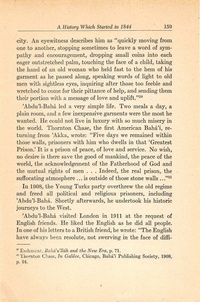 A History Which Started in 1844 159
A History Which Started in 1844 159
city. An eyewitness describes him as “quickly moving from one to another, stopping sometimes to leave a word of sympathy and encouragement, dropping small coins into each eager outstretched palm, touching the face of a child, taking the hand of an old woman who held fast to the hem of his garment as he passed along, speaking words of light to old men with sightless eyes, inquiring after those too feeble and wretched to come for their pittance of help, and sending them their portion with a message of love and uplift.””°
- Abdu’l-Baha led a very simple life. Two meals a day, a
plain room, and a few inexpensive garments were the most he wanted. He could not live in luxury with so much misery in the world. Thornton Chase, the first American Baha’i, returning from ’Akka, wrote: “Five days we remained within those walls, prisoners with him who dwells in that ‘Greatest Prison.’ It is a prison of peace, of love and service. No wish, no desire is there save the good of mankind, the peace of the world, the acknowledgement of the Fatherhood of God and the mutual rights of men . . . Indeed, the real prison, the suffocating atmosphere ... is outside of those stone walls ...”’
In 1908, the Young Turks party overthrew the old regime and freed all political and religious prisoners, including
- Abdu’l-Baha. Shortly afterwards, he undertook his historic
journeys to the West.
- Abdu’l-Baha visited London in 1911 at the request of
English friends.. He liked the English as he did all people. In one of his letters to a British friend, he wrote: “The English have always been resolute, not swerving in the face of diffi
- Esslemont, Bahdu’llah and the New Era, p. 71.
“Vhornton Chase, In Galilee, Chicago, Baha’i Publishing Society, 1908,
p. 24.
[Page 160]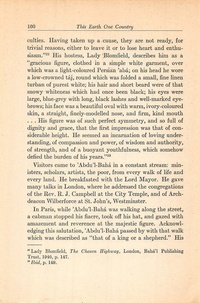 160 This Earth One Country
160 This Earth One Country
culties. Having taken up a-cause, they are not ready, for trivial reasons, either to leave it or to lose heart and enthusiasm.”*” His hostess, Lady “Blomfield, describes him as a “gracious figure, clothed in a simple white garment, over which was a light-coloured Persian ’abé; on his head he wore a low-crowned taj, round which was folded a small, fine linen turban of purest white; his hair and short beard were of that snowy whiteness which had once been black; his eyes were large, blue-grey with long, black lashes and well-marked eyebrows; his face was a beautiful oval with warm, ivory-coloured skin, a straight, finely-modelled nose, and firm, kind mouth . .. His figure was of such perfect symmetry, and so full of dignity and grace, that the first impression was that of considerable height. He seemed an incarnation of loving understanding, of compassion and power, of wisdom and authority, of strength, and of a buoyant youthfulness, which somehow defied the burden of his years.’’”*
Visitors came to ’Abdu’l-Baha in a constant stream: ministers, scholars, artists, the poor, from every walk of life and every land. He breakfasted with the Lord Mayor. He gave many talks in London, where he addressed the congregations of the Rev. R. J. Campbell at the City Temple, and of Archdeacon Wilberforce at St. John’s, Westminster.
In Paris, while ’Abdu’l-Baha was walking along the street, a cabman stopped his fiacre, took off his hat, and gazed with amazement and reverence at the majestic figure. Acknowledging this salutation, ’Abdu’l-Baha passed by with that walk which was described as “that of a king or a shepherd.” His
- Lady Blomfield, The Chosen Highway, London, Baha'i Publishing
Trust, 1940, p. 147.
- Ibid, p. 149.
[Page 161]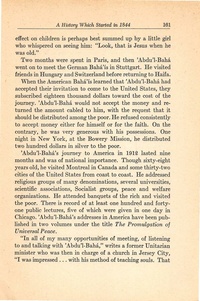 A History Which Started in 1844 161
A History Which Started in 1844 161
effect on children is perhaps best summed up by a little girl who whispered on seeing him: “Look, that is Jesus when he . was old.”
Two months were spent in Paris, and then ’Abdu’l-Baha went on to meet the German Baha’is in Stuttgart. He visited friends in Hungary and Switzerland before returning to Haifa.
When the American Baha’is learned that ’Abdu’l-Baha had accepted their invitation to come to the United States, they subscribed eighteen thousand dollars toward the cost of the journey. Abdu’l-Baha would not accept the money and returned the amount cabled to him, with the request that it should be distributed among the poor. He refused consistently to accept money either for himself or for the faith. On the contrary, he was very generous with his possessions. One night in New York, at the Bowery Mission, he distributed two hundred dollars in silver to the poor.
- Abdu’l-Baha’s journey to America in 1912 lasted nine
months and was of national importance. Though sixty-eight years old, he visited Montreal in Canada and some thirty-two cities of the United States from coast to coast. He addressed religious groups of many denominations, several universities, scientific associations, Socialist groups, peace and welfare organizations. He attended banquets of the rich and visited the poor. There is record of at least one hundred and fortyone public lectures, five of which were given in one day in Chicago. ’Abdu’l-Baha’s addresses in America have been published in two volumes under the title The Promulgation of Universal Peace.
“In all of my many opportunities of meeting, of listening
to and talking with “Abdu’l-Baha,” writes a former Unitarian
minister who was then in charge of a church in Jersey City,
“TI was impressed .. . with his method of teaching souls. That
[Page 162]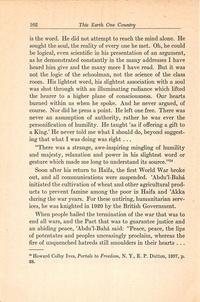 162 This Earth One Country
162 This Earth One Country
is the word. He did not attempt to reach the mind alone. He sought the soul, the reality of every one he met. Oh, he could be logical, even scientific in his presentation of an argument, as he demonstrated constantly in the many addresses I have heard him give and the many more I have read. But it was not the logic of the schoolman, not the science of the class room. His lightest word, his slightest association with a soul was shot through with an illuminating radiance which lifted the hearer to a higher plane of consciousness. Our hearts burned within us when he spoke. And he never argued, of course. Nor did he press a point. He left one free. There was never an assumption of authority, rather he was ever the personification of humility. He taught ‘as if offering a gift to a King.’ He never told me what I should do, beyond suggesting that what I was doing was right ...
“There was a strange, awe-inspiring mingling of humility and majesty, relaxation and power in his slightest word or gesture which made me long to understand its source.”**
Soon after his return to Haifa, the first World War broke out, and all communications were suspended. ’Abdu’l-Baha initiated the cultivation of wheat and other agricultural products to prevent famine among the poor in Haifa and ’Akka during the war years. For these untiring, humanitarian services, he was knighted in 1920 by the British Government.
When people hailed the termination of the war that was to end all wars, and the Pact that was to guarantee justice and an abiding peace, “Abdu’l-Baha said: “Peace, peace, the lips of potentates and peoples unceasingly proclaim, whereas the fire of unquenched hatreds still smoulders in their hearts .. .
- Howard Colby Ives, Portals to Freedom, N. Y., E. P. Dutton, 1937, p.
28.
[Page 163]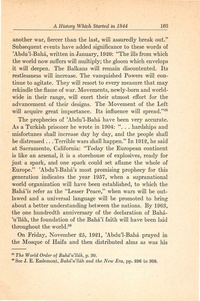 A History Which Started in 1844 163
A History Which Started in 1844 163
another war, fiercer than the last, will assuredly break out.” Subsequent events have added significance to these words of
- Abdu’l-Baha, written in January, 1920: “The ills from which
the world now suffers will multiply; the gloom which envelops
it will deepen. The Balkans will remain discontented. Its restlessness will increase. The vanquished Powers will continue to agitate. They will resort to every measure that may rekindle the flame of war. Movements, newly-born and worldwide in their range, will exert their utmost effort for the advancement of their designs. The Movement of the Left will acquire great importance. Its influence will spread.’’”?
The prophecies of ’Abdu’l-Baha have been very accurate. As a Turkish prisoner he wrote in 1904: “. . . hardships and misfortunes shall increase day by day, and the people shall be distressed ... Terrible wars shall happen.” In 1912, he said at Sacramento, California: “Today the European continent is like an arsenal, it is a storehouse of explosives, ready for just a spark, and one spark could set aflame the whole of Europe.” *Abdu’l-Baha’s most promising prophecy for this generation indicates the year 1957, when a supranational world organization will have been established, to which the Bah@#’is refer as the “Lesser Peace,” when wars will be outlawed and a universal language will be promoted to bring about a better understanding between the nations. By 1963, the one hundredth anniversary of the declaration of Baha’u’llah, the foundation of the Baha’i faith will have been laid throughout the world.”®
On Friday, November 25, 1921, ’Abdu’l-Baha prayed in the Mosque of Haifa and then distributed alms as was his
- The World Order of Bahd’wllah, p. 30.
- See J. E. Esslemont, Bahd’u’lléh and the New Era, pp. 296 to 308.
[Page 164]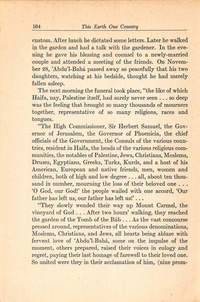 164 This Earth One Country
164 This Earth One Country
custom. After lunch he dictated some letters. Later he walked in the garden and had a talk with the gardener. In the evening he gave his blessing and counsel to a newly-married couple and attended a meeting of the friends. On November 28, “Abdu’l-Baha passed away so peacefully that his two daughters, watching at his bedside, thought he had merely fallen asleep.
The next morning the funeral took place, “the like of which Haifa, nay, Palestine itself, had surely never seen . . . so deep was the feeling that brought so many thousands of mourners together, representative of so many religions, races and tongues. ;
“The High Commissioner, Sir Herbert Samuel, the Governor of Jerusalem, the Governor of Phoenicia, the chief officials of the Government, the Consuls of the various countries, resident in Haifa, the heads of the various religious communities, the notables of Palestine, Jews, Christians, Moslems, Druses, Egyptians, Greeks, Turks, Kurds, and a host of his American, European and native friends, men, women and children, both of high and low degree . . . all, about ten thousand in number, mourning the loss of their beloved one... ‘O God, our God!’ the people wailed with one accord, ‘Our father has left us, our father has left us!’...
“They slowly wended their way up Mount Carmel, the
vineyard of God ... After two hours’ walking, they reached
the garden of the Tomb of the Bab .. . As the vast concourse
pressed around, representatives of the various denominations,
Moslems, Christians, and Jews, all hearts being ablaze with
fervent love of ’Abdu’l-Baha, some on the impulse of the
moment, others prepared, raised their voices in eulogy and
regret, paying their last homage of farewell to their loved one.
So united were they in their acclamation of him, (nine prom[Page 165]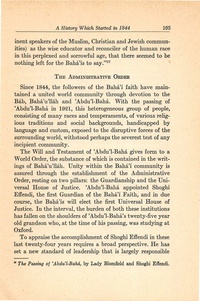 A History Which Started in 1844 165
A History Which Started in 1844 165
inent speakers of the Muslim, Christian and Jewish communities) as the wise educator and reconciler of the human race in this perplexed and sorrowful age, that there seemed to be nothing left for the Baha’is to say.”?" ’
Tue ADMINISTRATIVE ORDER
Since 1844, the followers of the Baha’ faith have maintained a united world community through devotion to the Bab, Baha’u’ll4h and ’Abdu’l-Baha. With the passing of
- Abdu’l-Baha in 1921, this heterogeneous group of people,
consisting of many races and temperaments, of various religious traditions and social backgrounds, handicapped by language and custom, exposed to the disruptive forces of the surrounding world, withstood perhaps the severest test of any incipient community.
The Will and Testament of ’Abdu’l-Baha gives form to a World Order, the substance of which is contained in the writings of Baha’u’ll4h. Unity within the Baha’i community is assured through the establishment of the Administrative Order, resting on two pillars: the Guardianship and the Universal House of Justice. “Abdu’l]-Baha appointed Shoghi Effendi, the first Guardian of the Baha’i Faith, and in due course, the Baha’is will elect the first Universal House of Justice. In the interval, the burden of both these institutions has fallen on the shoulders of ’Abdu’l-Baha’s twenty-five year old grandson who, at the time of his passing, was studying at Oxford.
To appraise the accomplishment of Shoghi Effendi in these last twenty-four years requires a broad perspective. He has set a new standard of leadership that is largely responsible
™ The Passing of ’Abdu’l-Bahé, by Lady Blomfield and Shoghi Effendi.
[Page 166]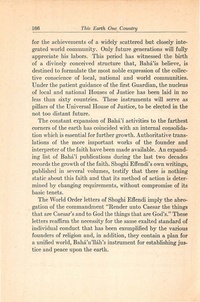 166 This Earth One Country
166 This Earth One Country
for the achievements of a widely scattered but closely integrated world community. Only future generations will fully appreciate his labors. This period has witnessed the birth of a divinely conceived structure that, Baha’is believe, is destined to formulate the most noble expression of the collective conscience of local, national and world communities. Under the patient guidance of the first Guardian, the nucleus of local and national Houses of Justice has been laid in no less than sixty countries. These instruments will serve as pillars of the Universal House of Justice, to be elected in the not too distant future.
The constant expansion of Baha’i activities to the farthest corners of the earth has coincided with an internal consolidation which is essential for further growth. Authoritative translations of the more important works of the founder and interpreter of the faith have been made available. An expanding list of Baha’i publications during the last two decades records the growth of the faith. Shoghi Effendi’s own writings, published in several volumes, testify that there is nothing static about this faith and that its method of action is determined by changing requirements, without compromise of its basic tenets.
The World Order letters of Shoghi Effendi imply the abro_ gation of the commandment “Render unto Caesar the things that are Caesar’s and to God the things that are God’s.” These letters reaffirm the necessity for the same exalted standard of individual conduct that has been exemplified by the various founders of religion and, in addition, they contain a plan for a unified world, Baha’u’llah’s instrument for establishing justice and peace upon the earth.
